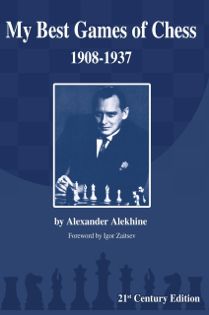My Best Games of Chess 1908-1937
Alexander Alekhine

The chess genius, Alexander Alekhine (1892-1946), twice world-champion, is one of the giants of chess history. All serious players have cut their teeth on studying Alekhines penetrating games and been instructed by his analyses. The vicissitudes of his life, including the question of to what degree he was used as a Nazi propagandist and his sudden death, continue to spark interest. Alekhine is like a thundering cataract on the chess landscape, his brilliancies, attacks, and positional masterpieces commanding coming generations to study deeply the legacies he has left us.
Thats why this new 21st Century Edition of Alekhines best games of chess by Russell Enterprises is so welcomed. The volume has a history. Two volumes of Alekhines best games have been available: 1908-23 and 1924-37. The Tartan reprints used the old descriptive-notation. But this new Russell edition has now used modern algebraic notation and combined these two volumes into one. All the materials are here, along with the original notes and variations for 220 games. Small errors have been corrected. Additions made include more diagrams, modern opening names and ECO codes. Indices of players and openings include the games found in the notes while the Summary of Results has been expanded to span Alekhines whole career, these being extended and corrected using authoritative sources. Alekhines complete match and tournament records are here. Plus, more than three-dozen photographs bring a wonderful sense of immediacy to the text. Crosstables also grace the pages of the book.
As if all this were not enough to convince one as to why this new edition is a must have addition to ones library, there is also a comprehensive computer-assisted analytical supplement compiled with the Rybka 3 analysis engine available free as a PDF, online. This adds yet another valuable dimension to the study of Alekhines masterpieces. Editor Taylor Kingston has done a superb job with this project. Interest is also added by Russian grandmater Igor Zaitsevs Foreword and the inclusion of J. Du Monts previously published Memoir of Alekhine. In short, all these features of this classic material make the volume one of the most basic resources for chess players of all strengths.
A part of the genius that was Alekhine is recognized by viewing his command of opening theory. His versatility in handling the one hundred thirty plus openings on display in this book testifies to his capabilities. Kingston points out that Alekhine was an innovator with opening theory. He is known for his Alekhines Defense, but Kingston notes that The Oxford Companion to Chess lists some nineteen Alekhine variations across a whole ranges of openings. Alekhine seemed to relish springing an unexpected approach on his unsuspecting opponents.
So we may expect in this collection of Alekhines best games, some of the most exciting, interesting, complex and beautiful ever playedand Kingstons judgment here is not disappointed. Time after time we witness Alekhines attacks, on both flanks which, as Zaitsev notes, was a new strategy for his time. Alekhine believed in the combination possibilities of every move and Zaitsev says he followed the principle that a chess combination must necessarily be timely! Alekhines sustained analytical work over four decades featured the outworking of that principle in hundreds of games.
The chess alone in these games is of the highest quality; and exciting. But another aspect of what renders this book a chess classic is Alekhines clear and penetrating annotations of the games. He was able to focus on the realities of each board situation and then to indicate further lines of play that could lead to different results than what a player was anticipating and than what actually transpired in the game. Alekhines comments in these regards are not only grounded in his own theoretical acumen but also in his knowledge of previous games from a variety of times, places, and players. So Alekhine could draw on the conventional wisdom of standard responses of his time as well as present his own line of potential directions.
Some of Alekhines comments along the way relate to his opponents play, and his own. Against Frank Marshall: A typical Marshall trap. Of Milan Vidmar: My games with Dr. Vidmar have generally been full of life and struggle. Of Max Euwe: Dr. Euwe has the same peculiar tendency to exchange queens at inappropriate moments. Of himself, Alekhine said after the opening move as Black (1.d4 c5) in a game against Bogoljubow: I consider the choice of this move as one of my chess sins. Because, if a champion, being human, cannot sometimes help adopting inferior opening moves, he must at least avoid those that he himself considers as not quite satisfactory. Then again: There are some moves of mine in the first Euwe match that I actually simply cannot understand. Neither before nor since have I played such decidedly unsound chess, especially in the openings! These touches certainly add to the enjoyment of this book!
Russell Enterprises is to be applauded for making this superb edition available. It will stand the test of timeas it already hasin being one of the foremost collections of games and one of the books that stands at the top in chess literature as an important and remarkable volume. It is a tribute to Alekhines own stature as one of the greatest chess players of all times. As J. Du Mont concludes his Memoir of Alekhine: Among lovers of chess, his name will live forever with those of Philidor, Morphy, Lasker and Capablanca.
